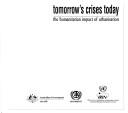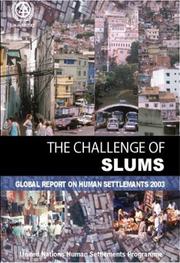| Listing 1 - 10 of 76 | << page >> |
Sort by
|
Book
Year: 2019 Publisher: Johannesburg : Wits University Press,
Abstract | Keywords | Export | Availability | Bookmark
 Loading...
Loading...Choose an application
- Reference Manager
- EndNote
- RefWorks (Direct export to RefWorks)
Politics and Community-Based Research: Perspectives from Yeoville Studio, Johannesburg provides a textured analysis of a contested urban space that will resonate with other contested urban spaces around the world and challenges researchers involved in such spaces to work in creative and politicised ways. This edited collection is built around the experiences of Yeoville Studio, a research initiative based at the School of Architecture and Planning at the University of the Witwatersrand, Johannesburg. Through themed, illustrated stories of the people and places of Yeoville, the book presents a nuanced portrait of the vibrance and complexity of a post-apartheid, peri-central neighbourhood that has often been characterised as a 'slum' in Johannesburg. These narratives are interwoven with theoretical chapters by scholars from a diversity of disciplinary backgrounds, reflecting on the empirical experiences of the Studio and examining academic research processes. These chapters unpack the engagement of the Studio in Yeoville, including issues of trust, the need to align policy with lived realities and social needs, the political dimensions of the knowledge produced and the ways in which this knowledge was, and could be used.
Slums. --- City planning --- Social aspects.
Book
ISBN: 9780199709557 9780195368369 9780199836833 0199798974 1282565230 9786612565236 0199709556 0195368363 Year: 2009 Publisher: New York Oxford University Press
Abstract | Keywords | Export | Availability | Bookmark
 Loading...
Loading...Choose an application
- Reference Manager
- EndNote
- RefWorks (Direct export to RefWorks)
A billion people, roughly half of all city dwellers in the developing world, live in squatter settlements. The most famous of these settlements are the favelas of Rio de Janeiro, which have existed for more than half a century and continue to outpace the rest of the city in growth. Janice Perlman's award-winning The Myth of Marginality was the first in-depth account of life in the favelas, and it is considered one of the most important books in global urban studies in the last 30 years. Now, in Favela, Perlman carries that story forward to the present. Re-interviewing many longtime favela residents whom she had first met in 1969 - as well as their children and grandchildren - Perlman offers the only long-term perspective available on the favelados as they struggle for a better life. Perlman discovers that much has changed in three decades, but while educational levels have risen, democracy has replaced dictatorship, and material conditions have improved, many residents feel marginalized more than ever. The greatest change is the explosion of drug and arms trade and the high incidence of fatal violence that has resulted. Almost one in five people report that a member of their family has been a victim of homicide. Yet the greatest challenge of all is job creation - decent work for decent pay. If unemployment and under-paid employment are not addressed, she argues, all other efforts - from housing to policing to community development - will fail to resolve the fundamental issues. A revealing study of the giant slums of Rio de Janeiro and of the vibrant communities of migrants who have risked everything to come to the city to provide more opportunities for their children, this book yields insights that apply to the entire global South, from Mexico City to Cairo, and from Mumbai to Lagos. Favela offers a powerful, long-term look at one of the great challenges facing the modern world - perhaps the major challenge of the twenty-first century.
Slums --- Poor --- Violent crimes --- Drugs --- Social aspects
Book
ISBN: 1617617024 9781617617027 9781617613142 1617613142 Year: 2011 Publisher: [Hauppauge, N.Y.]
Abstract | Keywords | Export | Availability | Bookmark
 Loading...
Loading...Choose an application
- Reference Manager
- EndNote
- RefWorks (Direct export to RefWorks)
Infants --- Slums --- Cities and towns --- Mortality
Book
ISBN: 1282707337 9786612707339 988220306X Year: 2004 Publisher: Hong Kong : Hong Kong University Press,
Abstract | Keywords | Export | Availability | Bookmark
 Loading...
Loading...Choose an application
- Reference Manager
- EndNote
- RefWorks (Direct export to RefWorks)
The book is concerned with the effects of globalization on living space (i.e. the space of everyday life), focusing specifically on East Asian metropolises, such as Hong Kong, Tokyo, and Shanghai.
City planning --- Open spaces --- Slums --- Skyscrapers --- Globalization --- Social aspects
Book
ISBN: 9798890845924 1469650002 1469649993 9781469649993 9781469650005 9781469649979 1469649977 9781469649986 1469649985 Year: 2019 Publisher: Chapel Hill
Abstract | Keywords | Export | Availability | Bookmark
 Loading...
Loading...Choose an application
- Reference Manager
- EndNote
- RefWorks (Direct export to RefWorks)
Licia do Prado Valladares's classic anthropological study of Brazil's vast, densely populated urban living environments reveals how the idea of the favela became an internationally establishedand even attractive and exoticrepresentation of poverty. The study traces how the term 'favela' emerged as an analytic category beginning in the mid-1960s, showing how it became the object of immense popular debate and sustained social science research. But the concept of the favela so favored by social scientists is not, Valladares argues, a straightforward reflection of its social reality, and it often obscures more than it reveals.The established representation of favelas undercuts more complex, accurate, and historicized explanations of Brazilian development. It marks and perpetuates favelas as zones of exception rather than as integral to Brazil's modernization over the past century.
Slums --- Poor --- History. --- Rio de Janeiro (Brazil) --- Social conditions. --- History
Book
ISBN: 1920541624 1306014263 1919895396 Year: 2011 Publisher: Claremont, South Africa : UCT Press,
Abstract | Keywords | Export | Availability | Bookmark
 Loading...
Loading...Choose an application
- Reference Manager
- EndNote
- RefWorks (Direct export to RefWorks)
"The UN's Millennium Development Target to improve the lives of 100 million 'slum' dwellers has been inappropriately communicated as a target to free cities of slums. ... [The book] traces the proliferation of this misunderstanding across several African countries, and explains how current urban policy ... encourages this interpretation. The cases it presents cover a range of conflicts between poor urban residents and the local and national authorities that seek to curtail their 'right to the city'."--Back cover.
Squatter settlements --- Slums --- Housing policy --- Urban poor --- Government policy --- Housing
Book
ISBN: 9780271080666 0271080663 9780271078434 027107843X 0271080647 Year: 2021 Publisher: University Park, PA
Abstract | Keywords | Export | Availability | Bookmark
 Loading...
Loading...Choose an application
- Reference Manager
- EndNote
- RefWorks (Direct export to RefWorks)
"Examines Pentecostalism, media, society, and culture in the turbulent favelas of Brazil. Explores both the evolving role of religion in Latin America and the proliferation of religious ideas and practices in the postmodern world"--Provided by publisher.
Slums --- Mass media --- Urban violence --- Pentecostalism --- Conversion --- Violence --- Religious aspects --- Pentecostal churches.

ISBN: 9210545958 9789210545952 9789211319644 9211319641 Year: 2007 Publisher: [Place of publication not identified] OCHA/IRIN
Abstract | Keywords | Export | Availability | Bookmark
 Loading...
Loading...Choose an application
- Reference Manager
- EndNote
- RefWorks (Direct export to RefWorks)
Urbanization --- Slums --- Urban poor --- Urban policy --- Humanitarian assistance --- Social science --- Humanitarian assistance.
Book
ISBN: 0520962796 9780520962798 9780520281066 0520281063 0520281071 9780520281073 Year: 2016 Publisher: Oakland, California
Abstract | Keywords | Export | Availability | Bookmark
 Loading...
Loading...Choose an application
- Reference Manager
- EndNote
- RefWorks (Direct export to RefWorks)
Urban slum dwellers-especially in emerging-economy countries-are often poor, live in squalor, and suffer unnecessarily from disease, disability, premature death, and reduced life expectancy. Yet living in a city can and should be healthy. Slum Health exposes how and why slums can be unhealthy; reveals that not all slums are equal in terms of the hazards and health issues faced by residents; and suggests how slum dwellers, scientists, and social movements can come together to make slum life safer, more just, and healthier. Editors Jason Corburn and Lee Riley argue that valuing both new biologic and "street" science-professional and lay knowledge-is crucial for improving the well-being of the millions of urban poor living in slums.
Urban ecology (Sociology) --- Cities and towns --- Urban health --- Slums --- Urban ecology --- Urban environment --- Social ecology --- Sociology, Urban --- Global cities --- Municipalities --- Towns --- Urban areas --- Urban systems --- Human settlements --- City health --- Urban public health --- Urbanization --- Public health --- Slum clearance --- Housing --- Health aspects. --- Environmental aspects --- Health aspects --- E-books --- biology. --- brazilian slums. --- economic scientists. --- emerging economies. --- global health. --- global poverty. --- global slums. --- global south. --- hazards of slum living. --- health equity. --- health inequities. --- health issues in urban centers. --- health issues of urban poor. --- human settlements. --- indian slums. --- international poverty. --- international urban poor. --- kenyan slums. --- slum dwellers. --- slum life. --- slums worldwide. --- social scientists. --- street science. --- urban poor. --- urban slums.

ISBN: 9786610476114 6000000189 1417583312 9781849772907 1849772908 9781136554766 1136554769 9781417583317 661047611X 1844070360 9781844070367 9781844070374 9781844070367 1844070379 1844070360 9781136554711 9781136554759 1136554750 1280476117 Year: 2003 Publisher: London: Earthscan,
Abstract | Keywords | Export | Availability | Bookmark
 Loading...
Loading...Choose an application
- Reference Manager
- EndNote
- RefWorks (Direct export to RefWorks)
The Challenge of Slums presents the first global assessment of slums, emphasizing their problems and prospects. Using a newly formulated operational definition of slums, it presents estimates of the number of urban slum dwellers and examines the factors at all level, from local to global, that underlie the formation of slums as well as their social, spatial and economic characteristics and dynamics. It goes on to evaluate the principal policy responses to the slum challenge of the last few decades. From this assessment, the immensity of the challenges that slums pose is clear. Almost 1 billion people live in slums, the majority in the developing world where over 40 per cent of the urban population are slum dwellers. The number is growing and will continue to increase unless there is serious and concerted action by municipal authorities, governments, civil society and the international community. This report points the way forward and identifies the most promising approaches to achieving the United Nations Millennium Declaration targets for improving the lives of slum dwellers by scaling up participatory slum upgrading and poverty reduction programmes. TheGlobal Report on Human Settlements is the most authoritative and up-to-date assessment of conditions and trends in the world's cities. Written in clear language and supported by informative graphics, case studies and extensive statistical data, it will be an essential tool and reference for researchers, academics, planners, public authorities and civil society organizations around the world.
Slums. --- Slums - Case studies. --- Slums -- Case studies. --- Slums - Government policy. --- Slums -- Government policy. --- Urban poor - Housing. --- Urban poor -- Housing. --- Urban poor - Statistics. --- Urban poor -- Statistics. --- Slums --- Urban poor --- 351.778.5 --- 711.4 --- 711.4 Gemeentelijke planologie. Stadsplanning. Stedenbouw --- Gemeentelijke planologie. Stadsplanning. Stedenbouw --- 351.778.5 Ruimtelijke ordening. Volkshuisvesting. Plannen van aanleg. Woningbouw.--Woonhygiene, zie {613.5}; z.o. {?711.6-164} --- Ruimtelijke ordening. Volkshuisvesting. Plannen van aanleg. Woningbouw.--Woonhygiene, zie {613.5}; z.o. {?711.6-164} --- City dwellers --- Poor --- Slum clearance --- Housing --- Government policy --- Social Sciences and Humanities. Sociology --- Government policy. --- Housing. --- Urban Society. --- Taudis --- Pauvres en milieu urbain --- Case studies. --- Statistics. --- Cas, Etudes de --- Politique gouvernementale --- Logement --- Statistiques --- Slums - Case studies --- Slums - Government policy --- Urban poor - Housing --- Urban poor - Statistics --- Urban poor.
| Listing 1 - 10 of 76 | << page >> |
Sort by
|

 Search
Search Feedback
Feedback About UniCat
About UniCat  Help
Help News
News